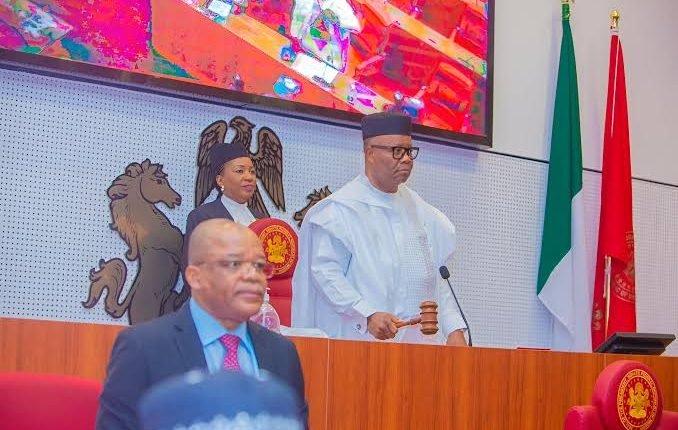In a move that has ignited widespread criticism, the National Assembly’s approval of a bill to bring back the old National Anthem has stirred the pot of controversy.
‘Nigeria, We Hail Thee,’ the former national anthem, composed by the Britons, once resonated as the lyrical heartbeat of the nation from Independence in 1960 until 1978 when it yielded its place to ‘Arise, O Compatriots.’
The bill, introduced simultaneously in the Senate and the House of Representatives, was swiftly ushered through the legislative chambers, receiving accelerated consideration and passage.
Amidst the backdrop of mounting inflation and security challenges, the velocity with which the bill was processed has drawn sharp rebuke from opposition lawmakers and civil society organizations.
Critics argue that the timing of the bill’s passage, amidst pressing national issues, reflects a misplaced sense of priority within the legislative corridors.
Informed sources suggest that efforts are underway to secure President Bola Ahmed Tinubu’s assent to the bill ahead of the first anniversary of his administration on May 29.
Analysts and CSOs have raised their voices in dissent, labeling the reintroduction of the old anthem as a misallocation of legislative focus and a disconnect from the realities on the ground.
According to Andrew Mamedu, Country Director of Action Aid Nigeria, “the bill to revert to the old National Anthem is an absolute misplacement of priorities and an abuse of legislative privilege.”
Mark Amaza, Yiaga Africa’s Senior Communications Officer, echoed similar sentiments, denouncing the legislators’ actions as “a misplacement of priorities.”
Comrade Ibrahim Zikirullahi, Executive Director of the Resource Centre for Human Rights and Civic Education (CHRICED), lamented the nation’s recurring trend of misplaced priorities and ineffective leadership.
Former Senator Shehu Sani emphasized the necessity of wider public consultation before tampering with the National Anthem, cautioning against any action that could be perceived as an attempt to dissolve Nigeria.
Is’haq Modibbo Kawu, a seasoned journalist and former Director-General of the National Broadcasting Commission (NBC), criticized the lawmakers’ decision as an embrace of metaphysical nostalgia, urging a focus on more rational problem-solving approaches.
However, Lanre Issa-Oninlu, Director-General of the National Orientation Agency (NOA), defended the move, emphasizing the importance of an anthem that resonates with the nation’s sentiment and calls citizens to action.
Efforts to solicit reactions from the spokespersons of the National Assembly yielded no response, maintaining a silence amidst the storm of criticism.
In the upper chamber, the bill swiftly advanced through readings, propelled by Senator Bamidele’s plea to discard the current anthem, which he claimed was forced on Nigerians by the military.
While the bill faced opposition in the House of Representatives, it ultimately passed through all stages of legislative scrutiny, setting the stage for the resurrection of the old National Anthem.
As the nation grapples with the resurgence of its musical past, the discordant tones of criticism reverberate across the political landscape, underscoring the contentious nature of the anthem’s revival.

